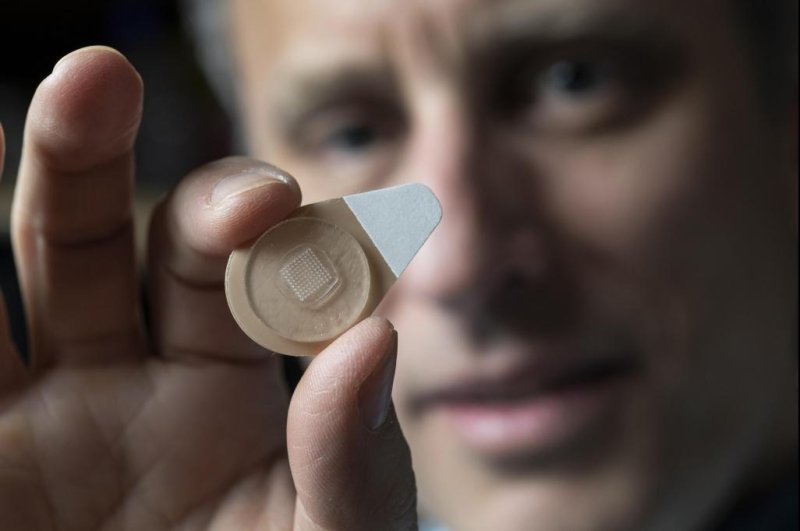The microneedles, which are made of the same materials as surgical sutures, would break off into the woman's skin after dispensing its time-released drug. Photo courtesy Christopher Moore/Georgia Tech
Jan. 15 (UPI) -- Women could soon have a long-acting contraception option for birth control they can apply to themselves, study says.
A new self-administered, long-standing patch could be the next safe contraceptive option for women, according a study published Monday in Nature Biomedical Engineering.
"There is a lot of interest in providing more options for long-acting contraceptives," said Mark Prausnitz, a professor at Georgia Tech and study corresponding author, in a news release. "Our goal is for women to be able to self-administer long-acting contraceptives with the microneedle patch that would be applied to the skin for five seconds just once a month."
A microneedle contraceptive patch method was able to increase the amount of levonorgestrel in lab rats, but the test didn't evaluate whether the patch could prevent pregnancy. Levonorgestrel is the normal drug used in many female-applied contraceptive devices.
Long-acting contraceptives currently on the market are less convenient, requiring women to constantly wear a product, to inject a contraceptive drug with a hypodermic needle or to have a doctor insert an intrauterine device.
If the microneedle contraceptive patch receives approval from the U.S. Food and Drug Administration, this would be the first self-administered device that doesn't require a hypodermic needle injection. The microneedles, which are made of the same materials as surgical sutures, would break off into the woman's skin after dispensing the time-released drug.
"The microneedle patch delivery platform being developed by Mark Prausnitz and his colleagues for contraception is an exciting advancement in women's health," said Gregory S. Kopf, director of R&D Contraceptive Technology Innovation at FHI 360. "This self-administered long-acting contraceptive will afford women discreet and convenient control over their fertility, leading to a positive impact on public health by reducing both unwanted and unintended pregnancies."
The researchers say the patch could reduce healthcare barriers for women in developing countries who need contraception.
The next step for the researchers is to develop a patch that women can apply every six months.
"There is a lot of interest in minimizing the number of health care interventions that are needed," Prausnitz said. "Therefore, a contraceptive patch lasting more than one month is desirable, particularly in countries where women have limited access to health care. But because microneedles are by definition small, there are limits to how much drug can be incorporated into a microneedle patch."















